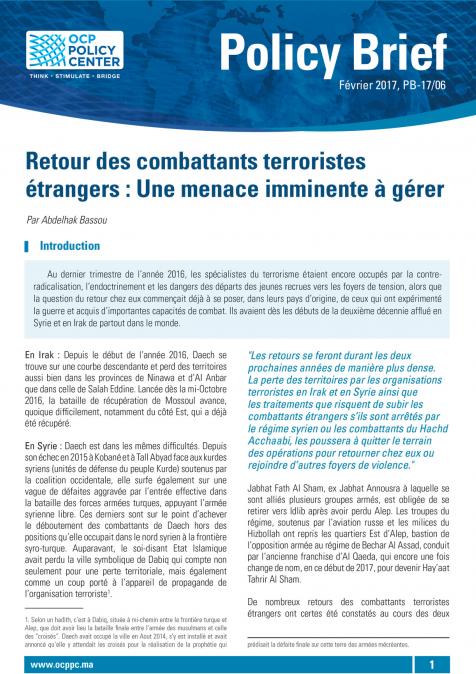In this interview, with Mr.Carlos Alexandre Monteiro Reis, Head of the Rabat Programme Office, UNOCT, Morocco, we discuss the current efforts being undertaken to counteract the radicalization of extremist movements, as well as the need for enhanced cooperation to support impoverished and less educated regions. We explore the connection between extremism and socioeconomic conditions, examining how collaboration can effectively address and mitigate these phenomena.
RELATED CONTENT
-
AuthorsSandra Polónia RiosPedro da Motta VeigaEduardo Augusto GuimarãesFebruary 22, 2017Despite the sustained growth in the bilateral trade observed at the beginning of the Century, Moroccan – Brazilian economic relations are still going through what could be called the ‘shallow’ phase of relations between two middle-income countries. Trade is concentrated in a few products – those where both countries enjoy long lasting and natural comparative advantages – and face strong difficulties to diversify in terms of products and to upgrade towards more complex models of lin ...
-
AuthorsFebruary 15, 2017During the last quarter of 2016, terrorism specialists were still busy with the issues of counter-radicalization, indoctrination, and the dangers of young recruits departing to tension hotbeds, when the question arose about the return to their countries of origin by those who have experienced war and acquired significant combat capabilities. For nearly the past decade, they have been flocking to Syria and Iraq from around the world. ...
-
AuthorsFebruary 15, 2017Au dernier trimestre de l’année 2016, les spécialistes du terrorisme étaient encore occupés par la contreradicalisation, l’endoctrinement et les dangers des départs des jeunes recrues vers les foyers de tension, alors que la question du retour chez eux commençait déjà à se poser, dans leurs pays d’origine, de ceux qui ont expérimenté la guerre et acquis d’importantes capacités de combat. Ils avaient dès les débuts de la deuxième décennie afflué en Syrie et en Irak de partout dans le ...
-
AuthorsFebruary 9, 2017The new Trump administration is openly protectionist. The President called for “America First” and for “Buy American, Hire American” in his inaugural speech and his subsequent actions dispelled any remaining doubt that he meant what he said during the election campaign. As promised, he has withdrawn from the Trans-Pacific Partnership, an agreement among twelve countries across three continents that took nearly 10 years to negotiate. He has threatened American companies that invest a ...
-
AuthorsTaoufik AbbadFebruary 3, 2017La réflexion développée dans cet ouvrage part d’un constat alarmant et pressant. Le processus continu et renforcé de l’accumulation du capital, dans lequel s’est engagé le Maroc depuis les années 2000, a permis certes de préserver la stabilité des équilibres fondamentaux et d’amortir les différents chocs exogènes, aussi bien internes qu’externes, mais il n’a pas permis d’insuffler un accroissement plus important des gains de productivité et d’accélérer la transformation de la base p ...
-
AuthorsFebruary 1, 2017L’analyse des relations commerciales entre le Maroc et l’Afrique subsaharienne fait ressortir un volume des échanges croissants, reflétant ainsi une dynamisation continue des leurs relations commerciales. Une tendance similaire est observée au niveau des investissements directs étrangers, qui ne cessent de croître au cours des dernières années, traduisant la volonté du Maroc à devenir un acteur majeur dans le développement du continent africain. Ce Policy Brief présente dans un prem ...
-
AuthorsFebruary 1, 2017An analysis of trade relations between Morocco and sub-Saharan Africa indicates a growing volume of trade, reflecting a continuation of stimulated trade relations. A similar trend is observed in foreign direct investment (FDI), which has continued to grow in recent years, reflecting Morocco's determination to become a major player in the development of the African continent. This Policy Brief first presents trends in inter-regional trade between Morocco and sub-Saharan Africa, focus ...
-
 AuthorsJanuary 25, 2017In previous pieces, we have analyzed the run up to the still-ongoing Brazilian recession as a combination of factors. Given an “anemia” of productivity increases, an appetite for public spending without prioritization led to a condition of fiscal “obesity”. The external factors that provided for a boom in the new millennium, notwithstanding underlying vulnerabilities, have dissipated. The economic policy adopted as a response to the growth decline aggravated those vulnerabilities. O ...
AuthorsJanuary 25, 2017In previous pieces, we have analyzed the run up to the still-ongoing Brazilian recession as a combination of factors. Given an “anemia” of productivity increases, an appetite for public spending without prioritization led to a condition of fiscal “obesity”. The external factors that provided for a boom in the new millennium, notwithstanding underlying vulnerabilities, have dissipated. The economic policy adopted as a response to the growth decline aggravated those vulnerabilities. O ... -
AuthorsMostapha MouzouniJanuary 23, 2017Alors que la menaces, que la criminalité transnationale organisée présentait dans les années 70 était considérée comme étant secondaire, le changement de sa nature, l’augmentation de ses risques et sa stigmatisation de plus en plus soutenue comme étant responsable des instabilités politiques et de certains conflits internes, a poussé la communauté internationale à s’inscrire dans une logique de confrontation avec ses aspects les plus menaçants à la sécurité internationale. Or curieu ...
-
AuthorsMostapha MouzouniJanuary 23, 2017Cooperation against transnational crime in the North Atlantic region is highly institutionalized in the framework of regional organizations that are reinforced by ancestral identities. Europol and the U.S. Joint Interagency Task Force-South are exemplary in this regard. The South Atlantic region, however, is less institutionalized, making the study of such cooperation a difficult exercise. With the exception of some actions initiated by specialized international organizations, there ...










